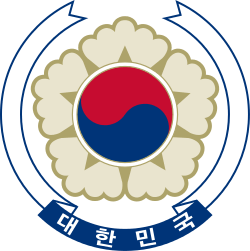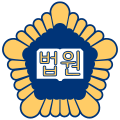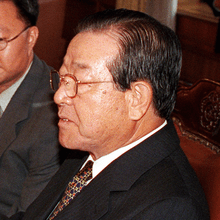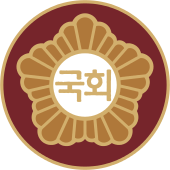South Korean legislative election, 2000
| | |||||||||||||||||||||||||||||||||||||||||||||||||||||||||||||||
| |||||||||||||||||||||||||||||||||||||||||||||||||||||||||||||||
| |||||||||||||||||||||||||||||||||||||||||||||||||||||||||||||||
 |
| This article is part of a series on the politics and government of South Korea |
| Constitution |

|
|
Judiciary 
|
Parliamentary elections were held in South Korea on 13 April 2000.[1]
Many surveys showed that the Democrats would have more seats and votes, but the result was a victory for the Grand National Party, which won 133 of the 273 seats in the National Assembly. The United Liberal Democrats lost 2/3 of their seats, due to GNP's victory in Gyeongsangbuk-do, Gangwon-do (South Korea), and also fewer local votes in Chungcheong. However, the GNP did not receive a majority, so the 16th parliament became a Hung Parliament, and it was the only parliament in South Korean history — until the 2016 election[2] — that the President's ruling party did not have a majority. So the Millennium Democrats, ULD and even Democratic People's Party (DPP) formed a coalition again to gain a majority, until the ULD withdrew support in 2001. The voter turnout was 57.2%. This election was the first election contested by the Democratic Labour Party, with no seats.
Results
| Party | Votes | % | Seats | +/– |
|---|---|---|---|---|
| Grand National Party | 7,365,359 | 39.0 | 133 | +13 |
| Millennium Democratic Party | 6,780,625 | 35.9 | 115 | +10 |
| United Liberal Democrats | 1,859,331 | 9.8 | 17 | –35 |
| Democratic People's Party | 695,423 | 3.7 | 2 | –5 |
| Democratic Labor Party | 223,261 | 1.2 | 0 | New |
| Young Progressive Party | 125,082 | 0.7 | 0 | New |
| New Korean Party of Hope | 77,498 | 0.4 | 1 | New(-) |
| Republican Party | 3,950 | 0.02 | 0 | New |
| Independents | 1,774,211 | 9.4 | 5 | –9 |
| Invalid/blank votes | 252,384 | – | – | – |
| Total | 19,157,124 | 100 | 273 | -26 |
| Source: Nohlen et al. | ||||
References
- ↑ Dieter Nohlen, Florian Grotz & Christof Hartmann (2001) Elections in Asia: A data handbook, Volume II, p420 ISBN 0-19-924959-8
- ↑ "Korea Elections: A Shocking Eruption of Public Dissatisfaction". The Asia Foundation. 2016-04-27. Retrieved 2016-05-17.
.jpg)
.png)

